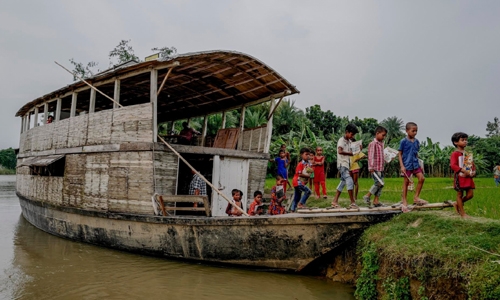The floating schools
Mosammat Rekha’s older cousins grew up unable to read and write, their tiny village so frequently cut off from the nearest school by floods that would rise suddenly in their remote corner of disaster-prone Bangladesh. But seven-year-old Mosammat is learning her ABCs aboard a boat fitted with a classroom and play equipment that is helping children thrive even as climate change alters the world around them.
“We can attend classes even during the rainy season, when our homes are barely above water,” the seven-year-old said aboard the vessel in Chalan Beel, some 175 kilometres (around 110 miles) northwest of Dhaka. Climate change is already taking its toll across Bangladesh, a densely populated and impoverished country the United Nations has identified as among the most vulnerable to a warming planet. Millions in the low-lying nation are being forced to adapt to overflowing rivers, rising seas and increasingly extreme weather in a country frequented by destructive storms and cyclones.
Twenty million people there could be made “climate refugees” by the end of the century, a UN panel has warned, turfed out of their homes as rivers swallow towns and seas encroach oncoastal communities. In villages like Kalidaskhali on the banks of the Padma River, these forces are already reshaping lives by the hour. As much as five metres (16 feet) of riverbank can disappear in a single day, consuming everything in its path, local government official Azizul Azam said.
More than 9,000 people have been displaced by the Padma in just five years, as the main tributary of the Ganges encroaches further and further inland. “Today my backyard is gone. I had a cowshed over there... now it is just water,” said Rukaiya Khatun, watching helplessly as chunks of earth disappeared into the turbid water inching towards her home. “The Padma has devoured everything.” River erosion -- though long a phenomenon in the delta nation -- is rapidly accelerating due to climate change, said Atiq Rahman, a member of a Nobel Peace Prize-winning UN climatepanel.
A warming planet has made monsoon rainfall more unpredictable across Bangladesh and melted Himalayan glaciers to the north, turbocharging the waterways that criss-cross the country. Many have struggled to adapt as the river has turned, in the words of one villager, “wild and furious”.
Related Posts

